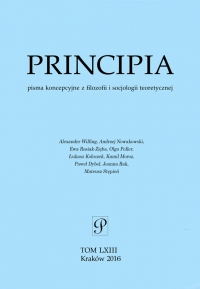Obrona deskrypcyjnej teorii odniesienia nazw. Część I. Odpowiedź na argumenty Kripkego: modalny i epistemiczny
In defence of a descriptive theory of reference for proper names Part I. A response to Kripke’s modal and epistemic arguments
Author(s): Olga PollerSubject(s): History of Philosophy, Philosophical Traditions, Special Branches of Philosophy
Published by: Wydawnictwo Uniwersytetu Jagiellońskiego
Keywords: descriptive theory of reference; proper names; descriptivism; Kripke’s modal argument; Kripke’s epistemic argument
Summary/Abstract: In this article, I defend a non-classical version of descriptive theory of reference-fixing for proper names against objections raised by Kripke. I consider that descriptive information associated by speakers with a proper name has semantic value and thus should be taken into account by any theory of proper names. I do not defend any one descriptive theory in particular, only general assumptions that can underpin different elaborations of a descriptive theory of names. In the first part of this paper, I will briefly explain the notion of descriptivism and how taking temporal parameters into account influences the formulation of the theses of descriptivism. Next I will explain why Kripke’s modal objection does not apply to a descriptive theory of reference-fixing, I formulate assumptions of the descriptive theory defended in this paper and respond to Kripke’s epistemic objection. In the second part (to be published in the next issue), I respond to particular strands of Kripke’s semantic objection and show that the defended version has all the virtues traditionally associated with descriptive theories.
Journal: PRINCIPIA
- Issue Year: 2016
- Issue No: 63
- Page Range: 85-108
- Page Count: 24
- Language: Polish

